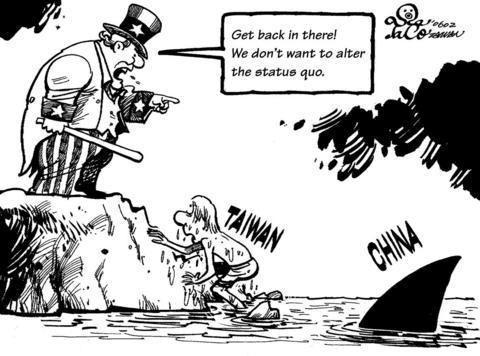You may be interested to know that your cartoon of Feb. 4 made it to a US Congressional hearing with Secretary of State Condoleezza Rice (on Thursday). We had given the cartoon to Congressman Steve Chabot, a Republican from Ohio, who made the following statement.
Gerrit van der Wees
Formosan Association for Public Affairs

Transcript of Representative Steve Chabot's comments to Condoleezza Rice at a Feb. 16 hearing:
In the time I've got left, let me just address one other issue -- cross-strait relations ... and our government's role in that area.
I've got a cartoon here which I believe came from the Taipei Times -- I'm sorry I don't have a better reproduction -- that shows a haggard looking fellow, labeled Taiwan, who is trying to extricate himself from a body of water because he is being approached by a shark, labeled China.
And he is being greeted by a rather large and menacing Uncle Sam, who appears to be holding a baseball bat. Uncle Sam is saying "Get back in there! We don't want to alter the status quo."
I use this cartoon as an illustration of the frustration I'm sure Taiwan's leaders must be feeling, and frankly, the frustration I am feeling.
It seems that every time Taiwan's democratically elected President Chen Shui-bian (陳水扁) opens his mouth, we read reports about consternation at the State Department and ominous quotes about Taiwan's attempts to change the status quo with its neighbor, the People's Republic of China (PRC).
Most recently, I understand that the State Department was gravely concerned about President Chen's decision to abolish the National Unification Council, a relic of the days when unification with China was advocated by the Taiwanese government.
Those days appear to be long gone. In fact, I'm told that the council has not met since 1999. It operated with an annual budget of US$31.
Thirty-one dollars. I think it might be a stretch to say it is a dangerous alteration of the status quo.
What I do think is a dangerous threat to the status quo is the ever-growing arms build-up in the PRC, especially the 784 missiles currently pointed at Taiwan -- a number which is increasing by around 100 per year.
That is a threat to the status quo. This increase comes after China's adoption of the so-called "Anti-Secession" Law, that, in effect, provides legal authority for China's leaders to invade democratic Taiwan. Another dangerous threat to the status quo, I would think.
Now, I will admit that I am not a big fan of our so-called "one China" policy.
I think it is wrongheaded and, frankly, dangerous, to pursue a policy that favors a dictatorship that continues to threaten war with Taiwan and has gained a reputation as one of the world's leading weapons proliferators.
Of course, I know the State Department position on "one China," but I wonder if the signals our diplomats are sending out to the world could be a little more balanced. Thank you, Madame Secretary.
The gutting of Voice of America (VOA) and Radio Free Asia (RFA) by US President Donald Trump’s administration poses a serious threat to the global voice of freedom, particularly for those living under authoritarian regimes such as China. The US — hailed as the model of liberal democracy — has the moral responsibility to uphold the values it champions. In undermining these institutions, the US risks diminishing its “soft power,” a pivotal pillar of its global influence. VOA Tibetan and RFA Tibetan played an enormous role in promoting the strong image of the US in and outside Tibet. On VOA Tibetan,
Sung Chien-liang (宋建樑), the leader of the Chinese Nationalist Party’s (KMT) efforts to recall Democratic Progressive Party (DPP) Legislator Lee Kun-cheng (李坤城), caused a national outrage and drew diplomatic condemnation on Tuesday after he arrived at the New Taipei City District Prosecutors’ Office dressed in a Nazi uniform. Sung performed a Nazi salute and carried a copy of Adolf Hitler’s Mein Kampf as he arrived to be questioned over allegations of signature forgery in the recall petition. The KMT’s response to the incident has shown a striking lack of contrition and decency. Rather than apologizing and distancing itself from Sung’s actions,

US President Trump weighed into the state of America’s semiconductor manufacturing when he declared, “They [Taiwan] stole it from us. They took it from us, and I don’t blame them. I give them credit.” At a prior White House event President Trump hosted TSMC chairman C.C. Wei (魏哲家), head of the world’s largest and most advanced chip manufacturer, to announce a commitment to invest US$100 billion in America. The president then shifted his previously critical rhetoric on Taiwan and put off tariffs on its chips. Now we learn that the Trump Administration is conducting a “trade investigation” on semiconductors which
By now, most of Taiwan has heard Taipei Mayor Chiang Wan-an’s (蔣萬安) threats to initiate a vote of no confidence against the Cabinet. His rationale is that the Democratic Progressive Party (DPP)-led government’s investigation into alleged signature forgery in the Chinese Nationalist Party’s (KMT) recall campaign constitutes “political persecution.” I sincerely hope he goes through with it. The opposition currently holds a majority in the Legislative Yuan, so the initiation of a no-confidence motion and its passage should be entirely within reach. If Chiang truly believes that the government is overreaching, abusing its power and targeting political opponents — then